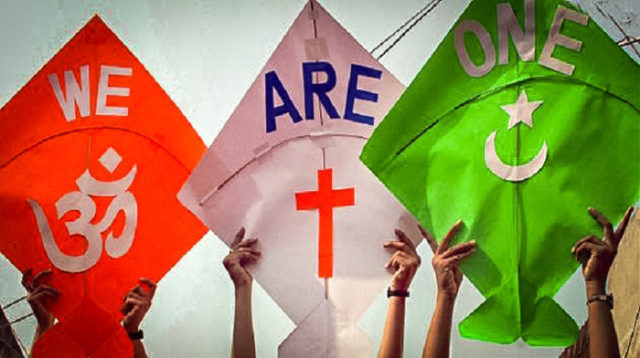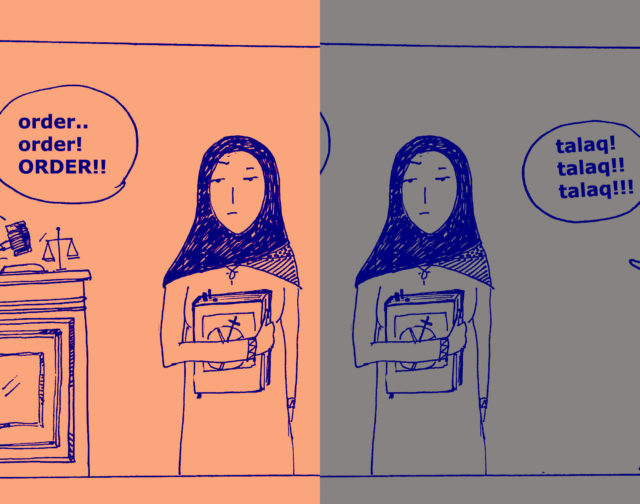If the Uniform Civil Code is enacted in India, it would truly be a radical, pro-choice step towards secularization of the personal spaces in our democracy. No matter how important culture is to our everyday living, their many exploitative measures have indeed hindered our development.
But how righteous would the implementation of the Uniform Civil Code be in a multicultural riddled nation as India?
It will not be easy. In that context, I want to understand how does a government that recognizes the injustice in an age-old personal law on one hand, parallelly issue a declaration which compromises on the same gender equality within another community?
Where do we draw the lines?
Why Did Our Government Take Two Steps Ahead With Triple Talaq But One Step Backward With Hindu Divorce Law?
It Started When…

The government on October 7th issued an affidavit stating that the Muslim practices of triple talaq, polygamy and nikah halala were unconstitutional even though they had sanctions under the Sharia Law.
There was outrage among the Islamic conservative groups who alleged that the government was targeting the minorities to dilute their religious identities and tamper with the secular right to observe any religious practices by choice.
Ironically, even though the debate then shifted to the Uniform Civil Code, the government’s affidavit doesn’t talk about it.
It was coincidental that the Law Commission issued a questionnaire regarding the same to its stakeholders. So, the All India Muslim Personal Law Board rejected it, and challenged the affidavit, citing that the government’s directive against triple talaq was a subversive initiative to impose UCC.
You should know,
Our State holds the right to issue a Uniform Civil Code as a part of their Directive Principles of State Policy, to allow the nullification of any personal law that overrides fundamental rights. The Uniform Civil Code can preside over marriage, divorce, inheritance, adoption and maintenance cases.
The Triple Talaq Agenda

Shayara Bano’s case in question was seen as an example whereby Muslim women’s fundamental right to live was being compromised.
The affidavit stated, “The fact that Muslim countries where Islam is the state religion have undergone extensive reforms to establish that the practices in question cannot be regarded as integral to the practices of Islam or essential religious practices.”
The BJP government had stated in their 2014 election manifesto that they would seek to issue the Uniform Civil Code to secularize personal laws in the country. Could this thus be seen as them leaning towards the secularization of personal laws in India steadily?
But in the same Universe, Hindu Men Needn’t Worry about Their Thrones

While all of this is very novel, let’s not forget the Supreme Court verdict that recently ruled against a wife in a divorce case, for wanting to live away with her husband from her in-laws.
It was cited as a case of cruelty because a woman was obliged to concede to live with her in-laws since the son was naturally responsible for his aged ailing parents. But what was offensive was not the particular ruling, but the rhetoric of the Court. The judgment took great pains to elaborate upon Hindu family traditions, and all about the ‘duties’ in a marriage.
“She becomes integral to and forms part of the family of the husband and normally without any justifiable strong reason, she would never insist that her husband should get separated from the family and live only with her,” Justice Dave observed. (Hindu, Oct 8)
Nobody really asked for such a detailed opinion from our apex court on the correct behavior of wife in a Hindu marriage.
Should the body of law that is supposed to defend women’s rights really worry about putting them back to their places? Isn’t a daughter obliged to look after her ailing aged parents too? Why isn’t there any objection regarding a daughter moving away after marriage?
Issuing Uniform Civil Code could rectify this rhetoric of accountability.
So, Are We Ready?
You tell me. Every time the agenda of UCC comes to the forefront, core issues gets sidelined. How can a country sustain a secular and egalitarian law when it is intrinsically divided within itself about moralities? It highlights one of the challenges of our plurality and inherent prejudices.
In some way, it is always easier for one community to rectify the mistakes in another community rather than their own. Our government is very proud to have moved ahead of Sati in Hinduism. But just reminding, it was the British who significantly supported and backed the Hindu activists.
Therefore, the need of the hour is to succinctly understand what secular and equal ideally mean, because no amount of legislation can remedy the discrimination and false morality we carry in our heart.
Read More:
http://edtimes.in/2016/10/sick-to-see-such-literate-men-supporting-triple-talaq/































